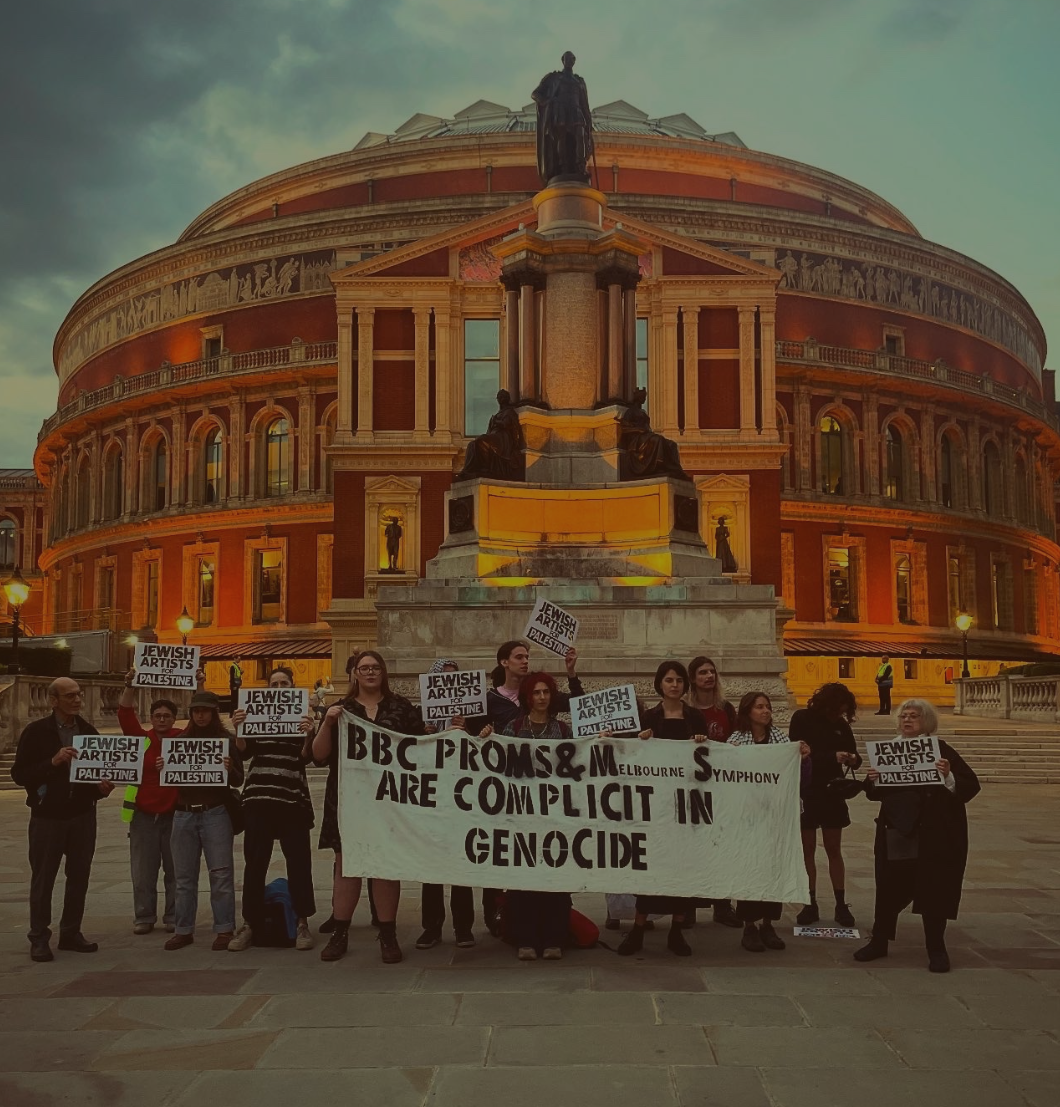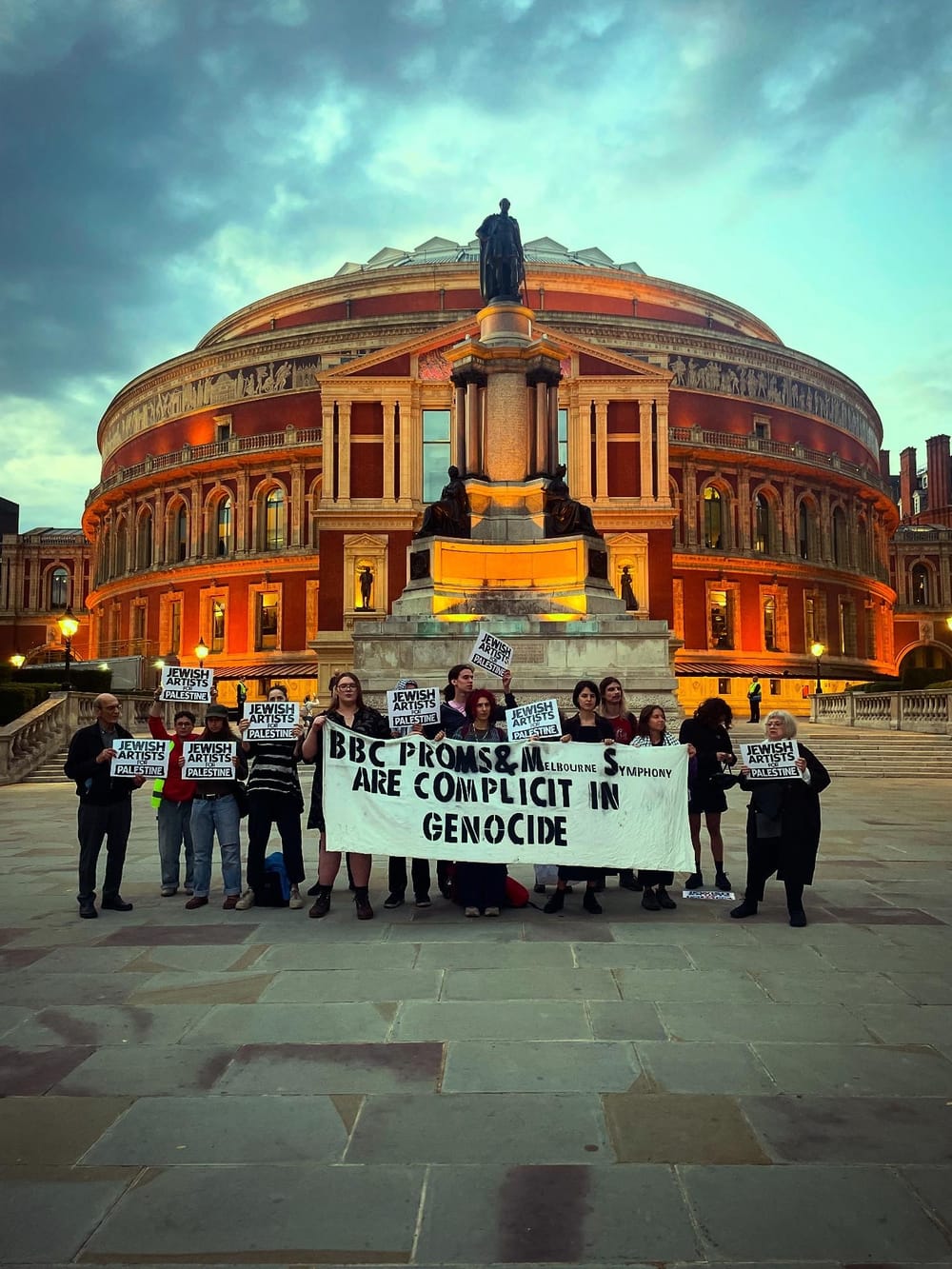Anti-Zionist art and the politics of cultural production
A letter to the editor and a response

In response to the publication of our weekly newsletter The Pickle on 24 October 2025, titled Jazz hands and hollow gestures — watching a play is not political action, a number of subscribers wrote to us with their thoughts.
Published below is a Letter to the Editor from Ben Spatz, expressing their concerns with the editorial, and a response from the article’s author (and Vashti editor), Kendall Gardner. Together, their letters examine the politics of cultural production, in particular in relation to anti-Zionist art, in a time of genocide.
We welcome thoughts on any of our publications. Email us at [email protected] with 'Letter to the Editor' in the subject line.
I am disappointed that Vashti Media (“A voice for the British Jewish left”) has published an editorial directly renouncing all forms of cultural production, using a rhetoric of crisis that undercuts the possibility of transformative political action. From the title’s dismissive use of “jazz hands” to caricature the alleged inefficacy of musical theatre, to the closing statement that “Instead of speaking out from within the confines of cultural production, we need to stop our production,” the article repeats many unfortunate antitheatrical tropes. More importantly, it undercuts the depth and breadth of any potential radical movement by assuming a temporality of urgency in which a single topic blots out everything else.
If there is ever going to be a free Palestine, this will be accomplished in solidarity with global Black and Indigenous movements and with clear awareness of the role of capitalism and climate crisis in the global situation today. To call for shutting down artistic production in general because “there should be no business-as-usual during a genocide” is to erase the many layers of cultural production — songs, images, stories, theoretical frameworks, and indeed sometimes plays — that have been produced by oppressed and marginalised groups throughout centuries of genocide, enslavement, and imprisonment.
Such a proposal is not just a sign of a shallow understanding of art and culture, but is also a superficial approach to political strategy. When the Palestinian Campaign for the Academic and Cultural Boycott of Israel (PACBI) calls for artists, academics, students, and others to “escalate their actions for Gaza” – as the Vashti article states – it appeals to us where we are, in the roles through which we are able to exert our power. We can only act as artists, as academics, as students. Escalating direct action might mean temporarily pausing one’s other work. But an overall call for “action over art” deeply misunderstands the function of art as action.
The author writes that “the proliferation of media from non-Palestinian (and all-too often, anti-Zionist Jewish) voices in the shadow of the genocide is unsettling.” This may read to some like a call for greater political urgency, and perhaps even efficacy, but to me it sounds more like the familiar collapse of whiteness into guilt and self-deprecation. By all means, let’s critique our own practices and look for ways to build deeper solidarities. I would agree with the claim that a lot of contemporary theatre is ethically and politically inadequate. But there is a thin line between decentering oneself and abdicating one’s responsibility – and this is not a line that can be easily policed. To boldly declare that “watching a play is not political action” is to misunderstand the history of politics as much as the history of theatre.
My brilliant colleague Benjamin Balthaser recently suggested that one reason why the right, including rightwing Jews, has not (so far) been able to harm Zohran Mamdani with the accusation of antisemitism – as they did to Jeremy Corbyn – is the greater visibility of exactly those anti-Zionist Jewish left voices in the US compared to the UK. This is something I have felt deeply over the past twelve years as an immigrant from New York to England. I am sorry to say that the Vashti editorial only exacerbates this problem. Here is “a voice for the British Jewish left” effectively announcing that there should be no Jewish cultural production, including anti-Zionist art, until the genocide in Palestine has stopped. Solidarities against other genocides, with the abolition of prisons, with Black Lives Matter, with indigenous protest around the world, with queer and trans culture and activism, and with radical climate action (struggles that continue to unfold in the arts and universities as well as in legal and political confrontations) do not figure in this narrow view of politics.
Far from decentering Jewish voices, this counterproductive narrowing of Jewish left politics to focus exclusively on Palestine also misunderstands why Palestine is so important in the planetary situation today. Palestine is not the only place where genocide is taking place, nor is genocide the only great evil that demands urgent and massive intervention. The fact that a UK organisation like Vashti feels pulled to focus so extensively on Palestine – which may or may not be the best way to prevent the rise of Reform and Trumpism in the UK – only makes sense if we understand Zionism in the context of a larger story about ongoing Euro-American imperialism. Our role in the Free Palestine movement comes as much from our relationship to the UK state as from our Jewishness. That this seems to be less well understood in the UK than in the US is due exactly to the lack of broader decolonial and antiracist left Jewish culture here. How are we going to build these understandings, themselves the basis for radical political action, if not through the epistemic force of culture?
Ben Spatz
Assistant Professor in Creative Practice
University of Birmingham
Thank you to Ben and other Vashti readers for engaging with my recent piece. I’m grateful for this opportunity to shine light on several points of contention and clarify the positions I advanced last week.
First, I’d like to reiterate that my critique does not apply equally to all forms of cultural production. As I wrote last week, cultural work varies in perspective, political intention, and proximity to the forces of capitalism. To be clear: I’m not suggesting that we stop making art; it is absolutely life-sustaining. However, when art veers into the business of life-taking – whether through the co-optation and hollowing out of radical politics or through nefarious funding agreements – we have a duty to take action to stop it. In these scenarios, the creation of or engagement with the art in question cannot overcome this structural complicity, even when the art itself poses a challenge to hegemonic narratives of power.
As a materialist, I do not believe we can disaggregate artistic and cultural production from the machinations of global capitalism. Does this mean that creators and audiences must quit art full stop? Of course not. It does mean, however, that artists are workers, and therefore, we can withhold our labour for political causes. In instances where art is funded by companies profiting from Israel’s genocide in Gaza and occupation of Palestine, I argue that direct political action is required to expose and divest from the material structures of the apartheid state. To the charge that my focus is too narrow, I’d respond that this exact tactic has been employed successfully across radical and revolutionary movements, both now and in recent history. Examples of this tactic include the Fossil Free Books Campaign and the anti-apartheid cultural boycott of South Africa.
I fundamentally disagree with the idea that Vashti’s (and by extension, my own) attention to Palestine comes at the expense of other political movements. I also think a framing of urgency is completely warranted. For me, at least, every moment of the unfolding settler-colonial, white supremacist ecocide that constitutes our modern world is one too many. I believe in the possibility of revolution within our lifetimes, and I believe that vision of the world requires urgent political action and sacrifice that so far, many (but certainly not all!) of us in the West have been unwilling to undertake. The question of the utility of Jewish identity in building this type of global movement is one that I will not tackle here, but I certainly welcome continued discussion and debate on this front.
Finally, as I say in the beginning of the piece, I do not begrudge cultural workers who err on the side of creation, even in the face of complicity with the structures of oppression they virulently oppose. I know that this is a difficult choice; it’s one that I constantly struggle with as a PhD candidate at an institution with over 49 current links to illegal Israeli activity and a deep history of colonial bloodshed. We all have terrains upon which we can struggle against the material forces underpinning colonialism. In this piece, I’m simply suggesting that we take cultural production seriously as one of those battlegrounds.
Kendall Gardner
Editor
Authors
Ben Spatz (they/he) is a nonbinary scholar-practitioner working at the intersections of artistic research and critical theories of embodiment and identity. They are Assistant Professor in Creative Practice at University of Birmingham.

Kendall Gardner is an editor at Vashti and a doctoral candidate in political theory at the University of Oxford.
Sign up for The Pickle and New, From Vashti.
Stay up to date with Vashti.



